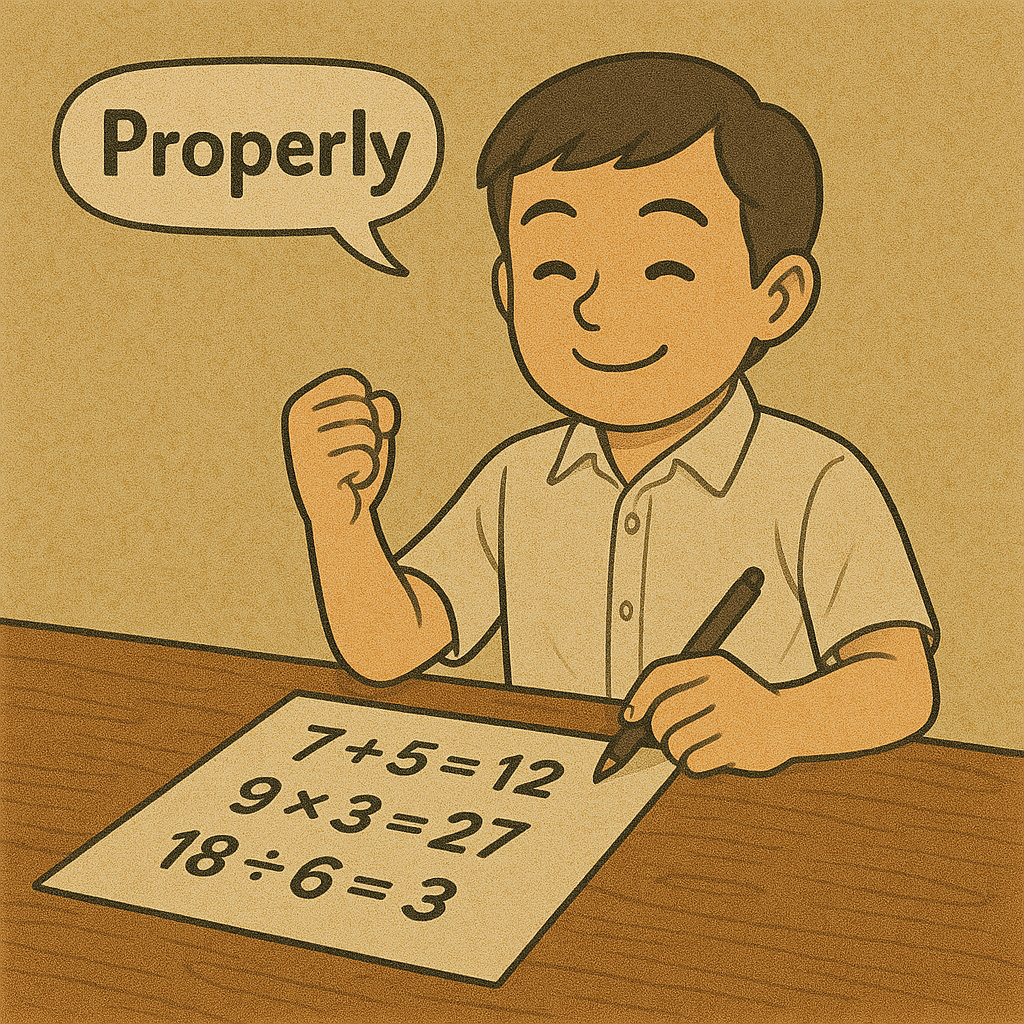Properly
Definition
The term "properly" describes doing something in a correct, suitable, or appropriate manner.
Parts of Speech
- Adverb
Pronunciation
American English
- IPA Pronunciation: /ˈprɑː.pɚ.li/
- Respelling: PRAH-pur-lee
British English
- IPA Pronunciation: /ˈprɒp.ə.li/
- Respelling: PROP-uh-lee
Etymology
The word "properly" originates from the Latin "proprius," meaning "one's own" or "appropriate." It evolved through Old French "propre" and Middle English "proper," gaining the adverbial suffix "-ly" to signify correct action or behavior.
Derivatives
- Proper (adjective)
- Improperly (adverb)
- Properness (noun)
- Appropriate (adjective, verb)
- Propriety (noun)
Synonyms
- Correctly
- Suitably
- Appropriately
Antonyms
- Incorrectly
- Inappropriately
- Improperly
Usage
The term "properly" is used to describe actions performed according to rules or expectations. For example, "She dressed properly for the formal event" or "The machine is not working properly."
Related Terms
- Correct: Free from error; accurate.
- Appropriate: Suitable or proper in the circumstances.
- Propriety: Conformity to accepted standards of behavior or morals.
Detailed Definitions
Adverb
- In a correct or accurate manner: Refers to doing something without errors or mistakes.
- Example: "He failed to properly fill out the application form."
- In a suitable or appropriate way: Refers to actions that match the situation or requirements.
- Example: "The task must be handled properly to avoid complications."
- Thoroughly or completely (informal): Refers to doing something in a complete or exact manner.
- Example: "Make sure the door is properly locked before leaving."
properly



🇨🇳 Mandarin
- 正确地 (Properly as in correctly): Zhèngquè de
- IPA Pronunciation: /ʈʂəŋ˥˩ t͡ɕʰyɛ˨˩˦ tə/
- Respelling in English: Zheng-que de
- 适当地 (Properly as in appropriately): Shìdàng de
- IPA Pronunciation: /ʂʐ̩˥˩ taŋ˥˥ tə/
- Respelling in English: Shi-dang de
🇮🇳 Hindi
- ठीक से (Properly as in correctly): Theek se
- IPA Pronunciation: /ʈʰiːk seː/
- Respelling in English: Theek se
- उचित रूप से (Properly as in appropriately): Uchit roop se
- IPA Pronunciation: /ʊtʃɪt̪ ruːp seː/
- Respelling in English: U-chit roop se
🇪🇸 Spanish
- Correctamente (Properly as in correctly)
- IPA Pronunciation: /ko.rek.ta'men.te/
- Respelling in English: Ko-rek-ta-men-te
- Apropiadamente (Properly as in appropriately)
- IPA Pronunciation: /aˌpɾo.pjaðaˈmente/
- Respelling in English: A-pro-pia-da-men-te
🇫🇷 French
- Correctement (Properly as in correctly)
- IPA Pronunciation: /kɔ.ʁɛk.tə.mɑ̃/
- Respelling in English: Ko-rek-te-man
- Comme il faut (Properly as in appropriately)
- IPA Pronunciation: /kɔ.m‿il fo/
- Respelling in English: Kom il fo
🇸🇦 Modern Standard Arabic
- بشكل صحيح (Properly as in correctly): Bishakl sahih
- IPA Pronunciation: /biʃækl sæħiħ/
- Respelling in English: Bi-shak-l sa-hih
- بشكل مناسب (Properly as in appropriately): Bishakl munasib
- IPA Pronunciation: /biʃækl munæsib/
- Respelling in English: Bi-shak-l mu-na-sib
🇧🇩 Bengali
- ঠিকভাবে (Properly as in correctly): Thikbhabe
- IPA Pronunciation: /ʈʰikbʱabe/
- Respelling in English: Thik-bha-be
- উপযুক্ত ভাবে (Properly as in appropriately): Upayukt bhabe
- IPA Pronunciation: /upojukt bʱabe/
- Respelling in English: U-po-yukt bha-be
🇷🇺 Russian
- Правильно (Properly as in correctly): Pravil'no
- IPA Pronunciation: /prɐˈvʲilʲnə/
- Respelling in English: Pra-vil-no
- Должным образом (Properly as in appropriately): Dolzhnym obrazom
- IPA Pronunciation: /ˈdolʐnɨm ɐˈbrazəm/
- Respelling in English: Dolzh-nym o-bra-zom
🇵🇹 Portuguese
- Corretamente (Properly as in correctly)
- IPA Pronunciation: /koʁeˈtɐmẽt(ʃ)i/
- Respelling in English: Ko-rre-ta-men-te
- Adequadamente (Properly as in appropriately)
- IPA Pronunciation: /adekwɐˈdɐmẽt(ʃ)i/
- Respelling in English: A-de-kwa-da-men-te
🇮🇩 Indonesian
- Dengan benar (Properly as in correctly)
- IPA Pronunciation: /dengan benar/
- Respelling in English: De-ngan be-nar
- Secara layak (Properly as in appropriately)
- IPA Pronunciation: /səˈt͡ʃara ˈlajaʔ/
- Respelling in English: Se-ca-ra la-yak
🇩🇪 German
- Korrekt (Properly as in correctly)
- IPA Pronunciation: /kɔˈʁɛkt/
- Respelling in English: Ko-rekt
- Ordentlich (Properly as in appropriately)
- IPA Pronunciation: /ˈɔrdn̩tlɪç/
- Respelling in English: Or-dent-lich
🇯🇵 Japanese
- 正しく (Properly as in correctly): Tadashiku
- IPA Pronunciation: /ta̠da̠ɕi̥kɯ̟β/
- Respelling in English: Ta-dashi-ku
- 適切に (Properly as in appropriately): Tekisetsu ni
- IPA Pronunciation: /te̞kʲise̞t͡sɨβ ni/
- Respelling in English: Te-ki-se-tsu ni
🇻🇳 Vietnamese
- Đúng (Properly as in correctly)
- IPA Pronunciation: /ɗɨwŋ˨˩˦/
- Respelling in English: Dung
- Đúng cách (Properly as in appropriately)
- IPA Pronunciation: /ɗɨwŋ˨˩˦ kaːk̚˦ˀ˥/
- Respelling in English: Dung cach
🇰🇷 Korean
- 제대로 (Properly as in correctly): Jedero
- IPA Pronunciation: /t͡ɕe̞dɛ̝ɾo̞/
- Respelling in English: Je-de-ro
- 적절히 (Properly as in appropriately): Jeogjeolhi
- IPA Pronunciation: /t͡ɕʌ̹k̚t͡ɕʰʌ̹ɭʱi/
- Respelling in English: Jeok-jeol-hi
🇹🇷 Turkish
- Doğru (Properly as in correctly)
- IPA Pronunciation: /doːɾu/
- Respelling in English: Do-ru
- Uygun bir şekilde (Properly as in appropriately)
- IPA Pronunciation: /ujɟun biɾ ʃeːkilde/
- Respelling in English: Uy-gun bir she-kil-de
Properly
Definition
Properly is an adverb that means in a way that is correct, appropriate, or suitable; correctly.
Parts of Speech
"Properly" is primarily used as an adverb.
Pronunciation
- IPA Pronunciation: /ˈprɑː.pər.li/ in American English and /ˈprɒp.ər.li/ in British English.
- Respelling: American (PRAH-pur-lee), British (PROH-puh-lee).
Etymology
The term "properly" is the adverbial form of the adjective "proper", which originates from the Latin word "proprius" meaning "one's own", "special". The "-ly" suffix is a common English suffix that's used to form adverbs from adjectives.
Derivatives
- Improperly
- Properly-speaking
Synonyms and Antonyms
Synonyms
- Correctly
- Suitably
- Appropriately
Antonyms
- Incorrectly
- Inappropriately
- Unsuitably
Usage and Related Terms
Usage:
- The equipment must be properly maintained.
- I can't properly express my gratitude.
Related terms:
- Proper
- Properly speaking
- Improperly
Detailed Definition
As an adverb, "properly" primarily means in a manner that is suitable, appropriate, or correct. It often suggests conformity to established standards or rules. It can also suggest an exact or particular sense.
Examples:
- The machine will not function unless it is properly calibrated.
- She was properly dressed for the formal event.
- Please make sure to properly dispose of your waste.
🇵🇰 Urdu
- صحیح طور پر (Properly as in correctly): Sahih tor par
- IPA Pronunciation: /sæħiħ t̪oːr pər/
- Respelling in English: Sa-hih tor par
- مناسب طور پر (Properly as in appropriately): Munasib tor par
- IPA Pronunciation: /mʊnæsɪb t̪oːr pər/
- Respelling in English: Mu-na-sib tor par





